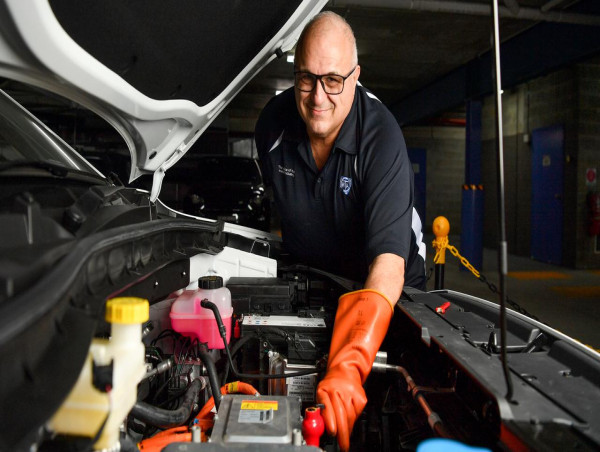Lift the bonnet of an electric vehicle and it might seem like something is missing.
Electric cars have no transmission, fuel pump, head gasket or spark plugs, and fewer moving parts overall.
The changes are stark enough to strike even a casual observer and could easily stump a home mechanic or panel beater but also have the potential to challenge trained mechanics.
Motor Trades Association NSW chief executive Stavros Yallouridis warns Australia is lagging behind the rest of the world in retraining its automotive workforce.
More than 100,000 Australian technicians will need to undergo further training to service the growing number of electric vehicles on Australian roads by 2030 and experts warn little attention has been paid to address the issue.
Automotive groups are calling for state and federal governments to take urgent action to boost electric vehicle training and avoid "a bungled EV rollout".
It's a predicament industry bodies raised following the last federal budget, which contained fringe benefits tax cuts to raise the uptake of electric vehicles but didn't address how they would be serviced.
Issues including fuel-emission standards and charging infrastructure dominated the debate about getting more electric cars on Australian roads but the question of maintaining them was ignored.
"Specialist training in electric car and battery maintenance for mechanics is critical to avoid workplace safety dangers and driver risks," Mr Yallouridis says.
NSW has more than 49,000 licensed automotive technicians, with more than 100,000 across the country.
Mr Yallouridis says the association has invested $1 million in procuring specialised electric vehicle equipment from Germany to create short educational courses in safety and maintenance.
But he says training the entire NSW workforce would cost more than $100 million and governments need to work with industry to share the cost and develop standards.
"To do anything less is reckless and puts the transformation in jeopardy, risking our country's ability to reduce emissions and meet our international obligations," Mr Yallouridis says.
"Nobody wants to see a bungled EV rollout. This has to be scaled up right the first time around."
More than 83,000 electric cars are being driven on Australian roads and more than 100,000 are predicted to hit streets in coming months.
Despite the modest numbers, Hugo Acosta from vehicle operations company Carma says the shortage in mechanics trained to service electric cars is already becoming apparent.
Mr Acosta says the company, which inspects, reconditions and sells second-hand vehicles online, is struggling to find mechanics trained to service both petrol and electric cars.
"There is a lag in offering certification and training for these technicians," he tells AAP.
Carma was in the market for a couple of apprentices but recruits faced limited opportunities and had to choose whether to complete four years of training in electric or petrol vehicles - not both.
"Of the registered training organisations, only seven are offering EV training for apprentices versus 168 organisations for (internal combustion engine) cars," Mr Acosta says.
"Obviously that's a challenge because you've got these new people coming into the industry and having to choose."
MTA NSW government relations and advocacy head Collin Jennings says automotive apprenticeships are also complicated by their practical component.
Each apprentice needs to be paired with a mechanic trained in servicing electric vehicles, which isn't yet a common qualification.
"A lot of what apprentices do is is on-the-job training," he says.
"While apprenticeships might start today, it will be a question of whether the person in that workshop supervising the apprentice has the skills (to service an electric vehicle)."
Workers in related fields will also need further training. Dealing with an electric car damaged in an accident, for example, could present risks to untrained staff.
"Each technician, be they working at a service centre, all the way through to tow truck drivers, panel beaters, spray painters, will all need to be upskilled in how to de-power an electric vehicle," Mr Jennings says.
"Electric vehicle batteries store up to about 800 volts. If they're damaged and not handled properly they can be dangerous."
Australia may have as little as seven years to ramp up training for thousands of new and experienced auto workers.
The ACT has adopted a sales target of 80 per cent electric vehicle sales by 2030, while Queensland, Victoria, South Australia and NSW aim to achieve a 50 per cent share of the market by then.
If governments don't collaborate with industry quickly, Australia's transport transition could face another speed bump.
"We don't want to be in a situation in five years where three quarters of the workforce don't know how to work with electric vehicles," Mr Jennings says.






